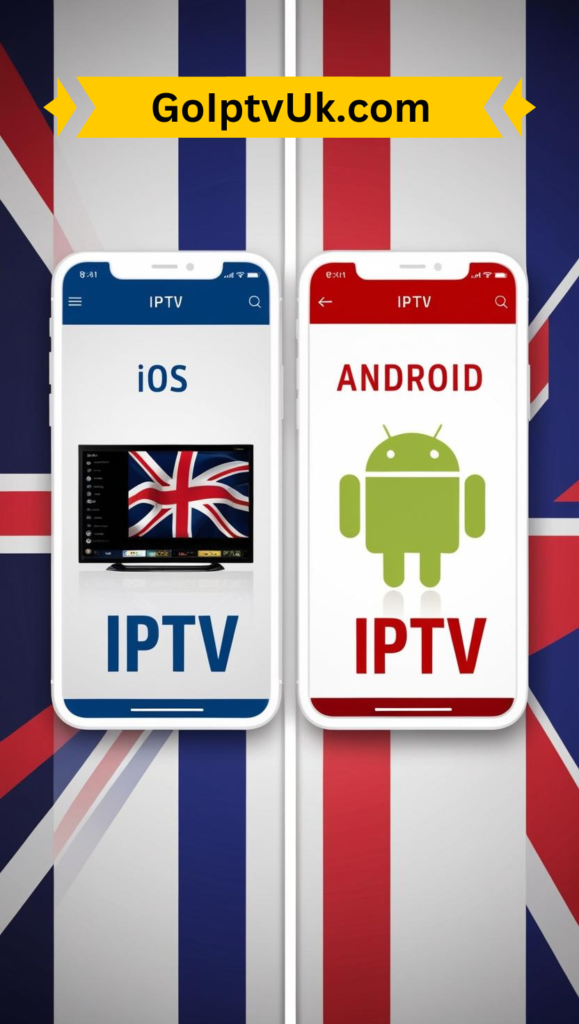
Introduction
Did you know that over 70% of smartphone users stream IPTV on their devices? Whether you’re watching live TV, catching up on your favorite shows, or enjoying a movie, your choice of device can make a big difference. When I first started streaming IPTV, I used an Android phone because it was what I had. But when I switched to an iPhone, I noticed some surprising differences—some good, some not so good.
If you’re trying to decide between iOS and Android for IPTV streaming, you’re in the right place. In this article, I’ll break down the key differences between the two platforms, share my personal experiences, and help you choose the best option for your needs. Let’s dive in!

Why Stream IPTV on Mobile Devices?
Streaming IPTV on your phone or tablet is a game-changer. Here’s why:
- Portability: Watch your favorite shows anywhere, anytime.
- Convenience: Use your device as a second screen while doing other things.
- Cost-Effective: No need for extra hardware like a set-top box.
Whether you’re on the go or just relaxing at home, mobile streaming makes it easy to stay connected to your favorite content.
Overview of Streaming IPTV on iOS vs Android
Before we compare the two, let’s quickly look at what each platform offers:
- iOS: Known for its smooth performance, security, and user-friendly interface. Apple devices like the iPhone and iPad are popular for their reliability.
- Android: Offers more customization, flexibility, and a wide range of devices. From budget phones to high-end models, there’s something for everyone.
Both platforms have their strengths, but when it comes to IPTV streaming, there are some key differences to consider.
Key Differences Between iOS and Android for IPTV Streaming
1. App Availability
- iOS: The App Store has strict rules, so not all IPTV apps are available. Some apps require sideloading using third-party tools like TestFlight.
- Android: The Google Play Store has more IPTV apps, and you can also sideload apps directly from APK files. This makes Android more flexible for IPTV streaming.
2. Performance and Stability
- iOS: Apple devices are optimized for smooth performance, so IPTV apps tend to run without crashes or lag.
- Android: Performance depends on the device. High-end Android phones work great, but budget models may struggle with buffering or crashes.
3. User Interface and Experience
- iOS: The interface is consistent and easy to use across all Apple devices.
- Android: The interface can vary depending on the device and manufacturer. Some users love the customization options, while others find it confusing.
4. Security and Privacy
- iOS: Apple is known for strong security features and regular updates. Your data is generally safe on iOS.
- Android: Security varies by device. High-end phones get regular updates, but budget models may not. This can be a concern for privacy.
5. Compatibility with IPTV Services
- iOS: Some IPTV services don’t have dedicated apps, so you may need to use a web player or workaround.
- Android: Most IPTV services offer dedicated apps, and you can also use third-party apps like Kodi for more options.
6. Cost and Accessibility
- iOS: Apple devices are more expensive, but they offer a premium experience.
- Android: There’s a wide range of devices at different price points, making it more accessible for everyone.
Best IPTV Apps for iOS and Android
For iOS:
- GSE Smart IPTV: A feature-rich app that supports multiple playlists and EPG.
- IPTV Smarters Pro: Easy to use and works with most IPTV services.
- Flex IPTV: A simple and lightweight app for basic streaming.
For Android:
- TiviMate: Great for organizing channels and EPG.
- Perfect Player: Lightweight and easy to use.
- Kodi with IPTV Add-ons: For advanced users who want more customization.
Tips for Streaming IPTV on iOS and Android
For iOS:
- Use a VPN to access geo-restricted content and protect your privacy.
- Keep your device updated to the latest iOS version for the best performance.
- Use AirPlay to stream IPTV content to your TV.
For Android:
- Use a VPN for privacy and access to more content.
- Regularly clear cache and update apps for optimal performance.
- Use Chromecast or Miracast to stream IPTV content to your TV.
Pros and Cons of Streaming IPTV on iOS vs Android
iOS Pros:
- Smooth and stable performance.
- Strong security features.
- Consistent user experience.
iOS Cons:
- Limited app availability.
- Higher cost of devices.
Android Pros:
- More app options and flexibility.
- Wide range of devices at different price points.
- Highly customizable.
Android Cons:
- Performance varies by device.
- Security updates are not guaranteed for all devices.
Conclusion
Streaming IPTV on mobile devices is a great way to enjoy your favorite content on the go. Whether you choose iOS or Android depends on your needs and preferences.
If you want a smooth, secure, and consistent experience, iOS is a great choice. But if you prefer more flexibility and customization, Android might be the better option.
No matter which platform you choose, make sure to use a reliable IPTV service and follow the tips in this guide to get the best streaming experience.
So, what are you waiting for? Start streaming your favorite shows and movies on your preferred device today!
Get your IPTV UK FREE Trial here!! and Subscription here!!

Leave a Reply